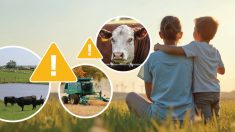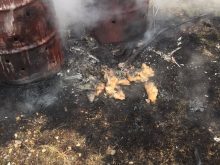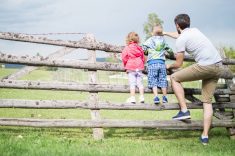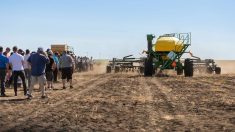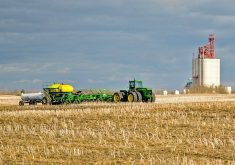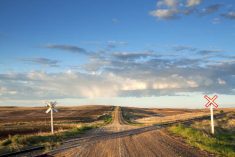In the midst of a farm safety seminar kicking off the annual meeting of the Keystone Agricultural Producers, some good news arrived.
In a joint announcement the federal and provincial agriculture ministers revealed a $1.1-million funding program over five years to support farm safety programming in the province.
The program is designed to develop safety tools, training and resources for farmers in Manitoba.
“Farming continues to be one of the most dangerous occupations in Canada, with risk of injuries increasing with the use of heavy machinery, working with livestock, fatigue and extreme weather conditions,” Manitoba Agriculture Minister Ralph Eichler said. “The Farm Safety Program will enable Manitoba farms to establish on-farm safety programs to keep their families, their workers and themselves safe while operating their businesses.”
Read Also

Mazergroup’s Bob Mazer dies
Mazergroup’s Bob Mazer, who helped grow his family’s company into a string of farm equipment dealerships and the main dealer for New Holland machinery in Saskatchewan and Manitoba, died July 6 from cancer.
Why it matters: Farming is one of the most dangerous occupations a person can have. The Manitoba Farm Safety Program will help build a safe workplace culture throughout the sector.
Delegates at the KAP AGM applauded the announcement and KAP president Bill Campbell echoed their approval.
“Safe practices on our farms are paramount to the safety of our producers, our employees and our families,” he said. “I encourage all farmers to take advantage of this programming to prevent injuries and accidents in our workplace.”
The FSP will continue to be administered by KAP, with design and development of the program being guided by the Farm Safety Council. The Farm Safety Council consists of representatives from a number of stakeholders including members appointed by Manitoba’s farm commodity associations, including Manitoba Pork Council, Manitoba Canola Growers Association, Vegetable Growers Association of Manitoba, Manitoba Egg Farmers, Dairy Farmers of Manitoba, Manitoba Corn Growers, Manitoba Beef Producers and Keystone Agricultural Producers.
Eichler said he was very happy to make the announcement and noted it underscored the growing profile of safety on the farm.
“We want to keep our farm families safe, he said. “This is an opportunity to get out and meet with the farmers. They’ve got a great staff put together to help us do this.”
A key member of that staff is Morag Marjerison. She is a consultant for the FSP and she is the one who actually goes out to the farms to speak to farmers about safety.
“It is good to hear that we got continuing support from the government to be able to offer these free services to farmers in the province,” she said.
Marjerison, herself a farmer for over 25 years, also has a background in workplace safety. She moved from the U.K., where she had been a cattle and sheep farmer near the border of England and Scotland, to Manitoba 15 years ago where she and her husband began farming in western Manitoba.
She downsized her operation after her husband passed away and now runs a hobby farm. Soon after her arrival in Manitoba, she soon took a job with Manitoba Workplace Health and Safety that was looking for an agricultural specialist. She began working for KAP three years ago.
Having a background in farming and safety helps her to relate to the complexities of farm life and the safety challenges that it entails.
“Farmers are independent minded,” she said. “In addition to their regular farming, they do all manner of other things: construction work; building repairs; they’re all welders; they do many, many jobs.”
She contrasted this with other industries where people typically specialize in one thing.
When farms were largely family-run businesses, there were no legal ramifications to taking calculated risks on one of these “many jobs.” But as farms grow in terms of acreage, farmers hiring workers are now exposed to legal risks for not following proper safety procedures.
“The reality is any farm with hired workers could be subject to workplace safety inspections,” Marjerison said. “The legislation has been applied to them for many years, but they aren’t all aware of that.”
Marjerison is the sole safety consultant for the FSP, so anyone requesting a consultation will be getting a visit from her.
“My role is to purely provide advice, she said. “I don’t have any legal mandate to tell farmers what to do.”
She said that one of the key needs FSP research has identified for farmers was needed access to advice about how safely legislation applies to their operation.
The FSP offers to put that into perspective for them. Marjerison will answer questions about what laws mean to a producer’s specific operation.
“I can do that in terms of discussion, documentation, or training,” she said. “I can do walk-around inspections and show them things that are not legally compliant.”
She explained it is a free service offered to any farm in Manitoba. She stressed that there’s no “feeding back” information to anyone else. It’s all confidential between herself and the producer.
“There is no obligation to act on anything the FSP is recommending,” she said. “It gives farmers a chance to ask questions about safety without somebody then coming to make them do things. The time I spend with a farmer – it’s their time. They can ask whatever they want; they can show me whatever they want.”
When asked if she thinks she’s making a difference doing what she does, she said it’s difficult to quantify a clear reduction in workplace accidents.
“We don’t hear about everything,” she said. “We only know what we are told about or reports from incidents on farms with Workers Compensation coverage, so we don’t have really good metrics for that kind of measurement.”
But she says that there is evidence that interest and awareness in safety is increasing simply by virtue of the increased demand for the products and services that FSP provides.








